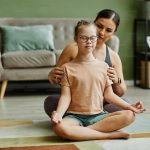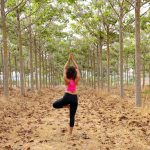Jackie Ngu (EMBA) has her fingers in many pies. She has an Executive MBA in Business, she’s a qualified Yoga Trapeze teacher, Vinyasa yoga teacher, life coach and Volunteer Mentor and coach for entrepreneurial women in developing countries. She is also deeply optimistic about the power of women supporting women.
1. When did you start practising yoga?
I started doing yoga at Uni many, many years ago. From my very first class, I was mesmerised. I remember looking around at everyone putting their bodies into all these fancy poses, and I thought ‘Oh my God, I love this.’
For many years I wasn’t consistent, but I always went back to it – high-intensity fitness workouts weren’t for me. Then, seven years ago, I made a point of committing to yoga and started to practice three or four times a week.
2. Why did you decide to become a Yoga Trapeze teacher?
When I started practising yoga all those years ago, there weren’t many people who looked like me in class. However, my attitude was that if it felt good to me I would keep doing it. This is what prompted me to think about teaching, to encourage people like me to try it. I’m actually quite shy though, so I kept putting it off.
During the last year of my Executive MBA, my sister passed away due to her mental health. After that, I found that I was coming to practise more and more often, and then an opportunity came up for a one-week, 100-Hour Yoga Trapeze teacher training course in Barcelona. I knew that I couldn’t pass up this exciting challenge. My husband thought I was crazy – I’d just finished my MBA and I should be thinking of a high-powered job!
It was the best thing I’d ever done.
3. Was it easy to find studios to teach Yoga Trapeze?
Once I qualified I came home all fired up and realised I now needed to find somewhere to teach! I eventually found a studio at the opposite end of the Central line from where I lived. It used to take me two hours to get there. I taught there for a few months before finding a couple of places much closer to home, and in fact, one physiotherapy practice even put up bars for me so I could teach in their studio.
4. You’re also a ‘normal’ yoga teacher – what prompted that?
When lockdown hit and all the yoga studios shut I realised I was going to have to diversify, so I did an online ‘mat’ yoga teacher training course whilst I was working full time. Once I qualified, I taught anything and everything online – I did Instagram lives, Facebook lives and taught neighbours and friends to keep my yoga teaching going. I’m also really pleased to say I now have one yoga trapeze client all the way in California, who found me on Instagram!
5. How do you motivate your yoga clients?
I always tell my clients is that yoga is a practice, not a workout. If you are consistent and put in the practise, you will feel results. The outcome is always different for each person, but you will get there, even if it’s so slowly you don’t even realise you’ve got there.
6. What are your plans as a yoga teacher post-lockdown?
I don’t want to go back to going from studio to studio. The large classes can feel very impersonal and the students often change from week to week. I really like being able to see the progression of my clients.
I’d like to retain my online clients but have more in-person workshops in studios, and hopefully run retreats as well.
7. How important is family to you?
I say to my family that if weren’t for them I’d still be in Barcelona (laughs). I love my sister and I won’t ever get over her loss – it’s as if it just happened yesterday. My children (aged 23, and twins, aged 17) remember her often, and her death has brought us closer. During lockdown they’re here at home, so we’ve had time to sit down to eat together, which we’d never have had time to do before. I always say I have two families – my biological family and my yoga family.
8. You also work as a Female Empowerment Coach – what would you say to your female clients to empower them after the year/week we’ve had?
These things [the murder of Sarah Everard, among others, and the subsequent actions of police at the vigil] happen as a reminder that we can be so powerful. During this lockdown, events have brought us together. Women are not always the best people to connect with – we feel like we have to compete. Everything that’s happened this year – BLM, Covid, lockdown – has made us reconnect. We’ve had to say to ourselves, “Hang on ladies, what are we doing here?” We are so much better together – we are a force. I’m quite positive.
9. What gives you this optimistic attitude about women?
When I was studying for my MBA I heard someone mention the organisation GrowMovement and that they needed volunteer mentors for women in rural Africa. I didn’t need to hear any more details, and signed up for it straight away.
For me, my business is not really about money, it’s about passion. For these women it’s about survival, it’s a very different ethos.
One woman I was mentoring needed to make enough money to finish building her house. Over the course of 24 sessions over 6 months, she made enough money from frying chips to finish her house – that’s what you call tangible results! Women are great.
10. You mentioned earlier that you always felt different – where did that stem from?
My parents were from Cameroon, and I was born when they were both studying here in the UK. At the time, it was common for children to live with foster families. So when I was three years old I went to live with this huge Irish family during the week, and then I’d come home at weekends. Then my parents moved to the US, and I was there for my primary school years. I struggled to fit in as I had a British accent. I felt different.
Then we moved to Cameroon – I’d never lived there before and although I now looked the same as everyone else, I still stuck out like a sore thumb because of my accent and mannerisms. Then I came back to the UK to take my O-levels, and I moved back in with the Irish family who I didn’t remember at all. This was in Wakefield where there were very few black people, so I was trying to fit in all over again.
When I got to Uni, I think it was the first time I felt normal, because everyone was different and trying to fit in. It’s taken a long time to accept, but I’ve finally reached the point where I no longer try to fit in. I do what feels good to me, even if it looks unusual to other people.
11. What do you hope people will take from the past year?
This year has been a period of reflection. I hope people don’t come out of it the same way they went in – I certainly haven’t. However, I think it would be a real shame not to use this time to make positive changes. We’ll (hopefully) never go through this time again. So I hope people use this time to come up with a way to reconnect to themselves and to be positively different.












